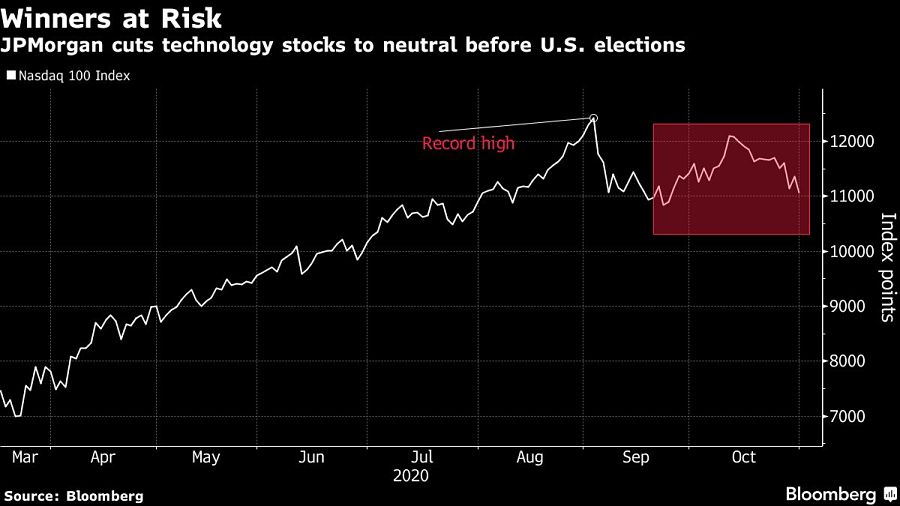

JPMorgan Chase & Co. strategists are dropping their longtime preference for technology stocks one day before the U.S. elections as they forecast a change in market leadership, no matter who wins the vote.
After being overweight tech for almost two years, strategists led by Mislav Matejka slashed to neutral the sector that has driven the recovery rally since March and raised their recommendation on banking and insurance stocks to overweight. Their call comes after the Nasdaq 100 Index has tumbled nearly 9% since Oct. 12.
“We believe the markets are primed for a broadening in leadership, having seen record-ever bifurcation so far year-to-date,” JPMorgan strategists including Prabhav Bhadani and Nitya Saldanha wrote in a note Monday. “The sector and style rotation is likely to get underway irrespective of the U.S. elections winner, while the regional rotation would be more dependent on the actual election outcome.”

U.S. tech giants have been leading the market recovery from March lows as investors viewed them as key winners from lockdowns. However, the Nasdaq 100 Index has fallen since reaching a peak in September on concerns about frothy valuations. Last week saw its worst sell-off in seven months after Apple Inc.’s iPhone sales and Twitter Inc.’s user growth both missed estimates.
The rotation in market leadership would stem from an economic recovery and possible positive news on the pandemic, according to JPMorgan. The strategists said tech’s outperformance could stall if bond yields start rising next year, even though their earnings and balance sheet fundamentals remain supportive. Banks and insurance stocks would in turn benefit from a pick-up in bond yields.
A clear outcome for the election would be a positive for equity investors, according to JPMorgan, as the market could then focus on fiscal stimulus measures. A contested result would lead to selling, they say, while recommending buying any weakness on a three- to six-month horizon.
And although a “blue wave” of Democratic wins and concerns over unfriendly market policies could also pressure stocks, the strategists say, they would see this as a chance to add to portfolios on bets of increased fiscal stimulus, a weaker U.S. dollar, steeper yield curve and easing trade uncertainty. While Matejka’s team is overweight U.S. and China stocks, which have outperformed Europe and emerging markets this year, they see this trend possibly changing in 2021.
“U.S. leadership has been consistent with growth outperforming value, and tech outperforming banks. This might not continue in 2021,” they write.

A new proposal could end the ban on promoting client reviews in states like California and Connecticut, giving state-registered advisors a level playing field with their SEC-registered peers.

Some in the industry say that more UBS financial advisors this year will be heading for the exits.

The Wall Street giant has blasted data middlemen as digital freeloaders, but tech firms and consumer advocates are pushing back.

Research reveals a 4% year-on-year increase in expenses that one in five Americans, including one-quarter of Gen Xers, say they have not planned for.

Raymond James also lured another ex-Edward Jones advisor in South Carolina, while LPL welcomed a mother-and-son team from Edward Jones and Thrivent.
Orion's Tom Wilson on delivering coordinated, high-touch service in a world where returns alone no longer set you apart.
Barely a decade old, registered index-linked annuities have quickly surged in popularity, thanks to their unique blend of protection and growth potential—an appealing option for investors looking to chart a steadier course through today's choppy market waters, says Myles Lambert, Brighthouse Financial.
